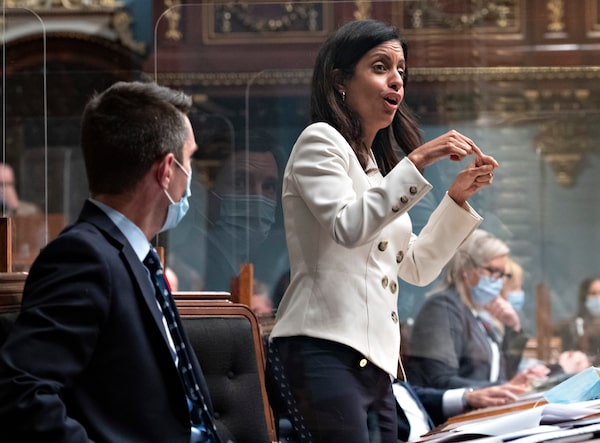
Quebec Liberal Leader Dominique Anglade speaks during question period at the provincial legislature in Quebec City on Nov. 2, 2021.Jacques Boissinot/The Canadian Press
Dominique Anglade has the most thankless job in Quebec politics.
Acclaimed Leader of the Quebec Liberal Party 18 months ago, after the only other candidate in the race dropped out, Ms. Anglade made history as the first Black woman to lead the province’s oldest political party – one that had, since 1867, been led by a succession of white men.
Liberals had good reason to believe she might be able to give Coalition Avenir Québec Premier François Legault a run for his money. She possessed an impressive résumé, with degrees in engineering and business, and a solid track record as a former minister of economic development in the Liberal government of premier Philippe Couillard. She had proved a strong debater, articulate and poised, with an ability to talk circles around Mr. Legault.
As the daughter of Haitian immigrants, she also represented modern Quebec’s diversity and openness to the world. She herself had quit the CAQ after it moved away from its emphasis on economic issues and adopted an increasingly anti-immigration tone following its disappointing showing in the 2012 election.
Dominique Anglade becomes first woman to lead Quebec Liberals after rival quits
Alas, Ms. Anglade inherited the top Liberal job at the worst possible moment, following its historic 2018 defeat. The Liberal-Parti Québécois duopoly that had defined Quebec politics for almost five decades had finally been upset by Mr. Legault’s CAQ, which embraced the PQ’s nationalism but rejected its all-or-nothing sovereigntist agenda. The PQ had been the perfect foil for the federalist Liberals. Its decline and fall deprived the QLP of its principal anti-referendum talking points.
Since then, the QLP has struggled to define itself. Under Mr. Couillard, it had been accused of having lost touch with nationalist (but federalist) Quebeckers, who had always formed part of the Liberal coalition. But Ms. Anglade’s initial attempts to woo francophone nationalists were met with criticisms from anglophone voters, who felt increasingly taken for granted by the QLP.
The debate over Bill 96, the CAQ government’s proposed legislation to strengthen the rights of francophones to work and live in their mother tongue, has underscored the dilemma Ms. Anglade has faced as QLP leader. She has remained evasive regarding key elements of the bill – including a proposed amendment to the Canadian Constitution to recognize Quebec as a nation and French as its sole official language – to the chagrin of francophones and anglophones alike.
This would all be bad enough for a party unused to flailing in the political wilderness. But the situation has been made immeasurably worse by a persistent problem of caucus indiscipline.
Ms. Anglade was forced to do damage control after a video surfaced of anglophone MNA Gregory Kelley at a June Black Lives Matter demonstration in which he appeared to draw connections between the CAQ’s immigration policies and Bill 21 (the law that bans some public servants from wearing religious symbols) and the 2020 death of Joyce Echaquan, an Indigenous woman who had been the victim of racist taunts by nurses at a Joliette, Que., hospital.
Ms. Anglade was then embarrassed by Pontiac MNA André Fortin’s decision to help Justin Trudeau with debate preparation during the federal election campaign. Mr. Legault had described the federal Liberals as “dangerous” for Quebec and hostile to the province’s autonomist demands, many of which the QLP supports. The QLP has traditionally gone to great lengths to distance itself from its federal counterpart.
Last week, Ms. Anglade removed MNAs Marie Montpetit and Gaétan Barrette as her party’s health and Treasury Board critics, respectively, after Ms. Montpetit criticized Mr. Barrette on Twitter. Mr. Barrette, a polarizing figure in Quebec politics after implementing unpopular reforms as Mr. Couillard’s health minister, had, in his own tweet, appeared to side with the Legault government in its crusade to force some family doctors to take on more patients, undermining his own party’s health critic.
Then, on Tuesday, Ms. Anglade kicked Ms. Montpetit out of caucus altogether after La Presse reported that the Montreal MNA faced allegations of psychological harassment by several former Liberal staffers, including at least one formal complaint to the National Assembly body charged with investigating such matters. Ms. Anglade suggested that, regardless of the outcome of a formal investigation, Ms. Montpetit would be prohibited from running for the QLP in 2022.
Ms. Montpetit won her Montreal riding by barely 500 votes in 2018. With her ouster, the QLP caucus is down to 27 members in the 125-seat provincial legislature. Based on recent polls, the party would be lucky to hold on to 20 seats in next October’s election, almost all of them in anglophone Quebec.
Quebeckers might still warm to Ms. Anglade on the campaign trail, especially as Mr. Legault’s harder edges become more evident by the day. But she is no longer likely vying for power. Merely ensuring the QLP’s survival will be a tough enough task.
Editor’s note: An earlier version of this column incorrectly referred to Geoffrey Kelley instead of his son Gregory.
Keep your Opinions sharp and informed. Get the Opinion newsletter. Sign up today.
 Konrad Yakabuski
Konrad Yakabuski